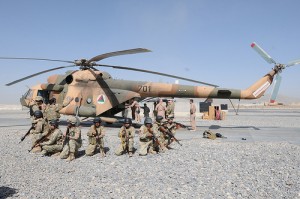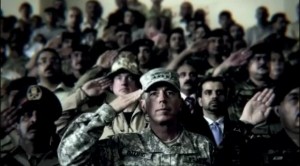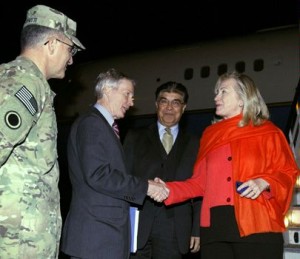Glenn Greenwald has a typically provocative post on the news that Marty Lederman and David Barron wrote the authorization to kill Anwar al-Awlaki. He uses Dawn Johnsen’s comments on the way secret OLC memos create secret law that undermine democracy.
Obama’s original choice to head the OLC, Dawn Johnsen, repeatedly railed against this Bush practice of concealing OLC memos as “secret law,” writing that “the Bush Administration’s excessive reliance on ‘secret law’ threatens the effective functioning of American democracy” and “the withholding from Congress and the public of legal interpretations by the Justice Department Office of Legal Counsel (OLC) upsets the system of checks and balances between the executive and legislative branches of government.” In her April, 2008 testimony before the Senate Judiciary Committee, she was nothing short of scathing on the practice of concealing OLC memos. [Glenn’s emphasis]
From there, he notes that Lederman and Barron used the same justification–the AUMF–that John Yoo used to justify the detention without due process of Jose Padilla.
So the AUMF allowed the President to designate Awlaki an “enemy combatant” without a shred of due process, and then to act against him using the powers of war, because we are at war with an entity for which Awlaki had become a combatant.
There are many problems with that reasoning, but one in particular that deserves attention now is this: that was exactly the theory repeatedly offered by the Bush DOJ for far less draconian acts than assassinating a U.S. citizen, and it was one that the very same Marty Lederman categorically rejected. As I’ve noted many times, one of the most controversial Bush/Cheney acts was its claimed power to detain U.S. citizen Jose Padilla without charges or due process — not to kill him, but merely detain him — on the theory that the AUMF authorized the President to designate him as an “enemy combatant” and treat him accordingly. [Glenn’s emphasis]
I’m not sure I buy this comparison. There are times when the US might legally wage war against one of its citizens, but because of its own secrecy, the Administration has simply not made the case that that is true in this case.
One of the big problems with Lederman and Barron’s interpretation of the AUMF, though–one Glenn doesn’t treat closely but which perfectly exemplifies Johnsen’s point–is the extension of the AUMF to apply to AQAP, an entity that simply didn’t exist when the AUMF authorized war against groups that had launched 9/11.
Other assertions about Mr. Awlaki included that he was a leader of [AQAP], which had become a “cobelligerent” with Al Qaeda, and he was pushing it to focus on trying to attack the United States again. The lawyers were also told that capturing him alive among hostile armed allies might not be feasible if and when he were located.
Based on those premises, the Justice Department concluded that Mr. Awlaki was covered by the authorization to use military force against Al Qaeda that Congress enacted shortly after the terrorist attacks of Sept. 11, 2001 — meaning that he was a lawful target in the armed conflict unless some other legal prohibition trumped that authority.
One area where Lederman’s reported memo is particularly dangerous, IMO, is in the extension of the AUMF to groups clearly not included in the congressional authorization.
All the more so given events that have transpired since the memo was written in June 2010. One of the first things the new Chair of the House Armed Services Committee, Buck McKeon, did after last year’s election was to call for a new AUMF. Notably, he wanted to include Yemen (and AQAP) in the new AUMF. The Administration was disinterested in that new AUMF, stating they believed already had the authority to do what they need to.
They claim to have that authority, of course, because Marty Lederman said they have it.
No wonder they discouraged a new AUMF! An open debate over the new terms of the AUMF might interpret AQAP more restrictively than Lederman did in secret, which might have challenged the OLC memo authorizing the Awlaki killing (yeah, I know, the chances of that are almost nonexistent).
Furthermore, I wonder whether the Administration told Congress they had already effectively legally expanded the AUMF? McKeon counterpart Carl Levin’s call for the Administration to release the memo makes me wonder whether he has seen it, and if not whether he knows the Administration legally expanded the AUMF by secret fiat.
Which is why Glenn’s point that the Administration avoided not just Article III oversight, during the ACLU/CCR suit, on this killing, but also Congressional oversight is so important. I don’t support McKeon’s effort to write a new AUMF. But it is undeniable that Congress proposed changing the law in such a way that would have given the Awlaki killing more–though probably not adequate–sanction. Rather than embracing the opportunity by working with Congress to formally extend the war to Yemen and AQAP, the Administration instead operated with the secret self-sanction Lederman had already given it.
The Administration chose not to avail itself of the opportunity to explain in the context of an Article III court why it had the authority to kill Awlaki. So, too, it chose not to avail itself of the opportunity to negotiate with Congress to give the Awlaki killing more (though not adequate) legal sanction. Instead, it used its own secret law-making power to do what the other two branches of government could have done with transparency and legitimacy.
Update: Meanwhile, McKeon is holding the Defense Authorization hostage to his bigotry.





